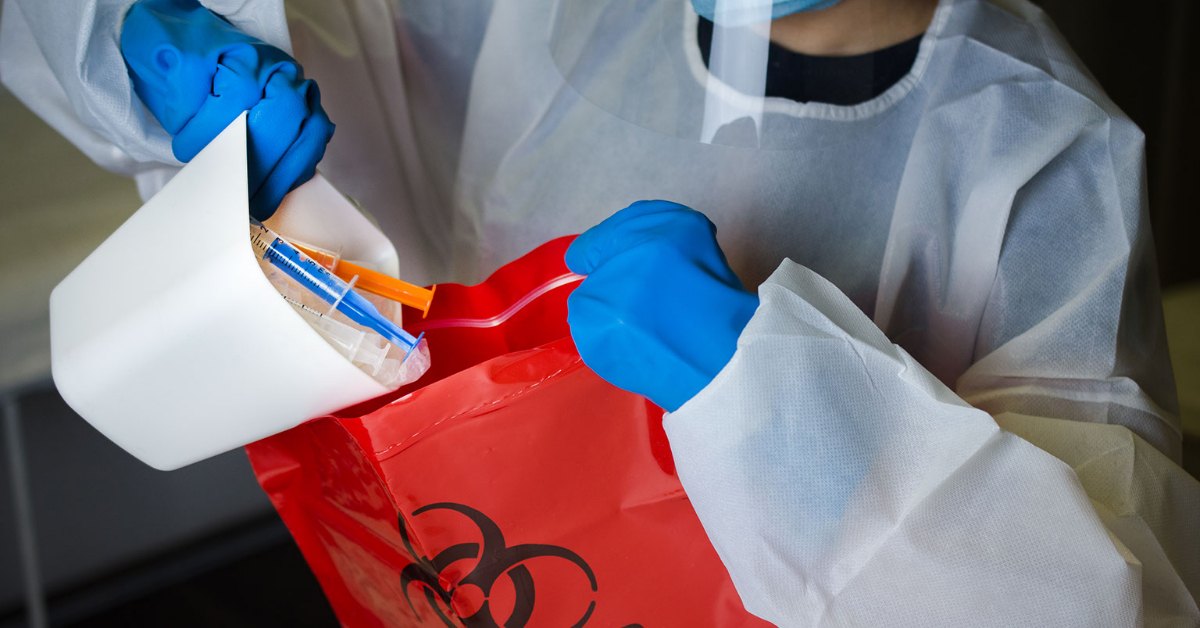The amount of hazardous healthcare and biological waste incinerated in Scotland increased by almost 4000% last year.
The volume of trash being burned, instead of going to landfill or being disposed of another way, has more than tripled in the last ten years.
Figures published by the Scottish Environment Protection Agency on Tuesday revealed the coronavirus pandemic had impacted on Scotland’s waste disposal.
More than 5900 tonnes of hazardous healthcare and biological waste were incinerated in 2020 – up 3900% on recent years.
The Scottish Environment Protection Agency (SEPA) said this was down to various factors including more of the medical trash being produced due to the Covid-19 pandemic, disposal of temporary stockpiles of the waste and an increase in the number of operational incinerators in the country.
Since March 1, 2020, National Procurement as part of National Services Scotland, has issued over 1524 million items of PPE to the health and social care sectors in Scotland.
Single-use masks, gloves, and overalls have been used in vast quantities along with non-recylclabe coronavirus test kits.
SEPA’s statistics revealed Scots recycled the lowest level of waste in seven years in 2020.
A British Medical Journal blog on the reliance on single-use plastic in healthcare urged against allowing it to become the “new normal”.
“Due to the pandemic, PPE has become a part of everyday life,” said Iain Gulland, chief executive of Zero Waste Scotland.
“The increase in PPE is largely unavoidable during a pandemic, where healthcare considerations are naturally paramount. In many cases, there are no alternatives to single-use items, such as plastic gloves and aprons. However, we can make a difference when it comes to face coverings.”
Zero Waste Scotland recommends Scots opt for reusable face coverings, where possible, to help tackle the problem of littered or incorrectly disposed of disposable masks.
“If you have used a disposable face covering, you should always dispose of this in the general waste bin, as they cannot be recycled and should never be littered,” Mr Gulland said.
The amount of healthcare and biological waste incinerated fell between 2019 and 2020 after the failure of NHS Scotland’s previous clinical waste contractor, Healthcare Environmental Services, saw a huge jump between 2018 and 2019.
In 2019, SEPA reported 8304 tonnes of the trash was burned, up from just 207 tonnes in 2018. But although this level decreased last year, it still remained several thousand times higher than previous years.
The total quantity of waste incinerated in Scotland in 2020 was 1.26 million tonnes – an increase of 855,000 tonnes (208%) from 2011.
In October, Scottish Green ministers launched a major review into the future of incinerators.
Circular economy minister Lorna Slater said the government wants to see materials remain in use for as long as possible before they are recycled with a Circular Economy Bill set to be announced to help make that happen.
“As well as reducing and recycling, we must deal with waste effectively. That’s why we have initiated an independent review of the role of incineration, which will make sure it aligns with our emissions reduction targets,” she said.
Terry A’Hearn, SEPA chief executive, said: “Last month, the world came to Glasgow to agree global action on the climate emergency. The message was clear that together, as counties, companies, or communities – we all have a role to play.
“How we use resources in our homes, workplaces, public services and private sector can have a real impact on Scotland’s environment. Whilst It’s positive that for a ninth consecutive year we see a move from landfill, the latest data does reflect the realism of the public health emergency.
“What’s important is not the past, but what we do next. We’ve shown that by working together, we can rise to the challenge of a healthcare emergency. We need now to show that we can do this again in tackling the climate crisis.”
A Scottish Government spokesperson said: “The significant increase in the incineration of healthcare waste in Scotland pre-dates the pandemic and was due to the failure of NHS Scotland’s previous clinical waste contractor.
“The amount of healthcare waste incinerated in Scotland actually decreased between 2019 and 2020.”
A spokesperson for SEPA said: “Scotland’s globally ambitious net zero and circular economy strategies set Scotland a clear course to become a modern, prosperous, inclusive and sustainable economy.
“Where new facilities do come forward, SEPA will ensure they are designed and operated to ensure they only accept non-recyclable waste, achieve a high level of energy efficiency and meet strict emission limits to protect the environment and human health.
“Waste reduction, reuse and recycling are Scottish success stories. Energy recovery plays a small but important role in the safe and responsible treatment of currently non-recyclable materials which would have otherwise gone to landfill.”
Follow STV News on WhatsApp
Scan the QR code on your mobile device for all the latest news from around the country


 iStock
iStock
























